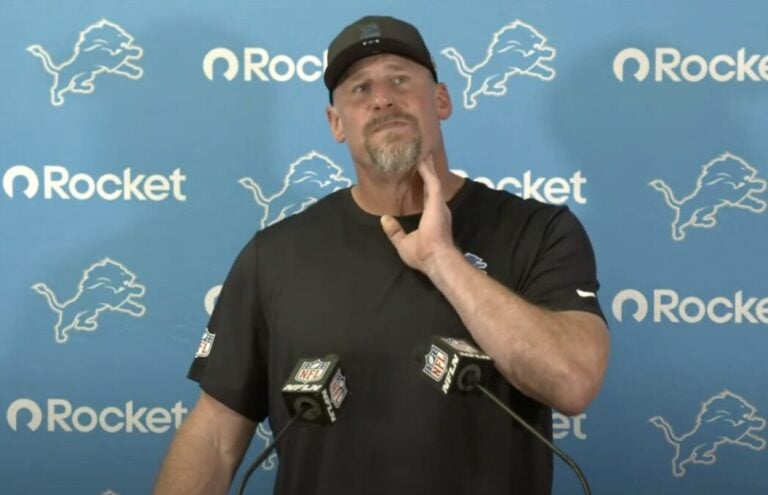After fiery remarks from the Detroit Lions head coach, the NFL steps in to set the record straight on one of the season’s most debated officiating calls.
NFL Pushes Back on Campbell’s “Came From New York” Assertion
The Detroit Lions may be roaring through the 2025 season as true contenders, but one controversial play from their Week 6 matchup against the Kansas City Chiefs continues to echo across the league. What should have been a highlight-reel moment—a trick-play touchdown pass from running back David Montgomery to quarterback Jared Goff—instead turned into one of the year’s most debated officiating decisions.
Initially ruled a touchdown, the play was later nullified for illegal motion, erasing six points and leaving head coach Dan Campbell visibly furious. After the game, Campbell claimed the decision had been made “from New York,” referring to the NFL’s Art McNally GameDay Central, where real-time replay reviews occur.
However, the league has now firmly denied that claim.
Troy Vincent Clears the Air
NFL executive vice president of football operations Troy Vincent addressed the controversy directly in an interview with Mike Florio of ProFootballTalk, clarifying that the league’s central replay command center had no involvement in the decision.
“It was not, and I’m not sure who coach Campbell was referring to, but we did not (intervene),” Vincent said. “We did not assist in that. We didn’t have to. I am part of that. I’m part of GameDay Central on every game.”
Vincent emphasized that illegal motion penalties cannot be called by GameDay Central—they are strictly handled by on-field officials. He added that the audio from the game clearly captured the referees discussing the infraction before the touchdown was scored.
“You heard the officials talking immediately as the play was going on, prior to even the touchdown,” Vincent explained.
The Late Flag and the Confusion That Followed
The timing of the flag—thrown well after the ball crossed the goal line—sparked confusion among fans and analysts alike. Vincent likened the delay to how officials handle intentional grounding, where multiple referees must verify different aspects of the rule before signaling a penalty.
“They’re communicating,” Vincent said. “In this particular case, even though it was a motion—an illegal shift here—they needed to confirm positioning and timing before the call was made. It’s very similar to intentional grounding.”
This account mirrors the postgame comments from lead referee Craig Wrolstad, who explained that several officials had to confer before determining whether Goff had properly paused before going in motion.
“It’s my job to see if the quarterback stopped initially (behind center),” Wrolstad said. “The down judge watches the player in motion, and we had to communicate between him, my umpire, and my line judge whether or not he initially stopped at the quarterback position and then whether he stopped after he went in motion out of my view.”
According to Wrolstad, that exchange led to “a little bit of confusion,” hence the late penalty flag.
The Broader Issue: Transparency in Officiating
While the NFL’s clarification may close the book on the “came from New York” theory, the incident highlights a recurring tension between coaches’ trust and league transparency. Campbell’s frustration wasn’t just about losing six points—it was about the perception of inconsistency and lack of clarity in officiating decisions.
For a Lions team fighting to maintain its status as a Super Bowl contender, moments like this sting all the more. Yet, as the league continues to refine communication between referees and replay officials, this episode serves as a reminder: even in a game of inches, trust and transparency remain the hardest things to measure.
